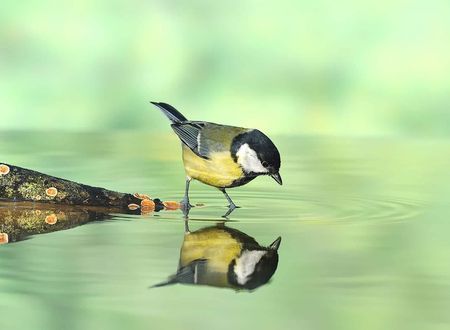Maxim Gorky said, “Once there was a crow. It flew from the field to the hill, from hedge to hedge, and lived its life. Then it died and rotted away – what’s the sense in it? there just isn’t any!”
Yet, most of us go through our lives like Gorky’s crow. Why?
Have you ever sat down and examined the nature of your thoughts? Not merely as a witness but as an analytical observer? So that you are not just watching your thoughts like a mute spectator but dissecting and categorizing each one of them as it emerges in your mind. It’s not easy, for it requires razor-sharp mindfulness and alertness. It is an advanced type of contemplative meditation. This post, however, is not about meditation. Although related, it is about an entirely different matter: our worries.
When not busy, our mind is constantly worrying about one thing or another. Even when you sit down to meditate, it takes an enormous effort to keep it focused as it wanders off like a lost sheep separated from its flock. Why do we worry so much? Most of us are uncomfortable with our past, we are worried about our future and we are concerned about our present. We are stressed about the state of affairs, the economy and a million other things.
The most amusing and disturbing thing is, we mostly worry about things that are completely beyond our control.
Even though we have no control over the past, most of us worry a great deal about the skeletons in the closet. We don’t want anyone to see our dirty laundry. You may be bothered by what others think of you, or why don’t they love you or recognize you, but once again, you can’t control their thoughts. Heck, they don’t have any control over their own thoughts. A bit of worrying is okay because it helps you to plan your life and it makes you think through your actions. Excessive worrying, however, is a disease.
The question is: why do we worry about things that we know very well we can’t do anything about? The answer is disarmingly simple. Worrying is a habit. And, two things make it persistent. First, fear, and, second, uncontrolled thoughts. Fear can be tackled by taking the right action (see here) while meditation can help you tame uncontrolled thoughts. The one who has mastered the art of channelizing one’s thoughts wades through the river of life as effortlessly as a lion navigates the jungle.
Having said that, the focus of my writing today is the third dimension, an alternative approach to life that can help you rise above your worries. It begins with the acceptance that adversity, challenges and undesirable incidents make up a significant portion of our lives. A lot of what we wish to avoid in life, whether people or circumstances, is mostly unavoidable. Take it as a given that resistance is an aspect of progress. There’s a Latin word for this: amor fati which means the love of fate.
Amor fati doesn’t mean that we lead a life of resignation and dejection. On the contrary, it means to be upbeat and bold in accepting things about ourselves and our lives that we have no control over. This understanding brings about great calm and peace. I’m reminded of Friedrich Nietzsche, who said in his work, The Gay Science, “I want to learn more and more to see as beautiful what is necessary in things; then I shall be one of those who make things beautiful. Amor fati: let that be my love henceforth! . . . And all in all and on the whole: some day I wish to be only a Yes-sayer.”
This one quote has the wisdom of a lifetime. To see as beautiful what is necessary in things; then I shall be one of those who make things beautiful. It’s only when we begin to see the beauty in what we must endure in life that our life truly starts to become beautiful. The one who sees the beauty of life as it is and is firmly established in the equanimity of the mind is called a stitha-pragya (stitha-prajñā) in Vedic literature. Nietzsche says profoundly in Ecce Homo, “My formula for greatness in a human being is amor fati: that one wants nothing to be different, not forward, not backward, not in all eternity. Not merely bear what is necessary, still less conceal it—all idealism is mendacity in the face of what is necessary—but love it.”
We are not on this planet to waste our life by constantly worrying about this and that. Worrying takes the life out of our life. Somewhere, one must gather the courage to set oneself free, to be where one wants to be, to do what you’ve always longed to. This is how fulfillment is going to come into your life. This is how life is going to feel complete. Work will never end. There’ll always be a list of outstanding action items. But, in all this, we must not forget to live. Adequately. Gracefully. Here’s my favorite poem on this. Leisure by W.H. Davies.
What is this life if, full of care,
We have no time to stand and stare.
No time to stand beneath the boughs
And stare as long as sheep or cows.No time to see, when woods we pass,
Where squirrels hide their nuts in grass.
No time to see, in broad daylight,
Streams full of stars, like skies at night.No time to turn at Beauty’s glance,
And watch her feet, how they can dance.
No time to wait till her mouth can
Enrich that smile her eyes began.A poor life this if, full of care,
We have no time to stand and stare.
It’s truly baffling to think how we spend decades and decades worrying about baseless things, living in unnecessary fear. That we wait for a vacation and when we finally get to it, we simply zip through beautiful country roads ignoring the meadows, the farms, flora and fauna.
Every night, before going to bed, Mulla Nasrudin’s wife would make him double-check all the locks and doors because she feared burglars. She would wake up in the dead of the night and pester Mulla to check the house once again. Several years passed like this when one night Mulla heard a sound in his basement.
His wife was fast asleep, but Mulla couldn’t ignore the noise. He went downstairs and surely enough there was a burglar.
“Thank God,” Mulla said. “Finally, you show up! Come and meet my wife upstairs. She’s been waiting 20 years to meet you.”
Insuring your car is one thing whereas being paranoid about meeting with an accident is another altogether. The latter is worrying.
When was the last time you saw the full moon? Or the last time you dunked your biscuit in some tea (and, in doing so, dropped the soggy bit into the cup)? Or welcomed the rain by letting the crystal droplets of water soak you in grace? Step out and see the world, the starry sky, and you’ll realize how much you’ve been blessed with already; how little there is to worry about.
We don’t have to be Gorky’s crow feeding on fear when we can be the Himalayan swan nibbling on the pearls of life. Life doesn’t need to be full of worries when it can be bubbling with happiness and joy. Let’s not sit and whine about what life could or should be. Instead, let’s see it for what it is and transform it into what it can be — a marvel, a wonder.
Peace.
Swami
A GOOD STORY
There were four members in a household. Everybody, Somebody, Anybody and Nobody. A bill was overdue. Everybody thought Somebody would do it. Anybody could have done it but Nobody did it.
Don't leave empty-handed, consider contributing.It's a good thing to do today.









Comments & Discussion
10 COMMENTS
Please login to read members' comments and participate in the discussion.